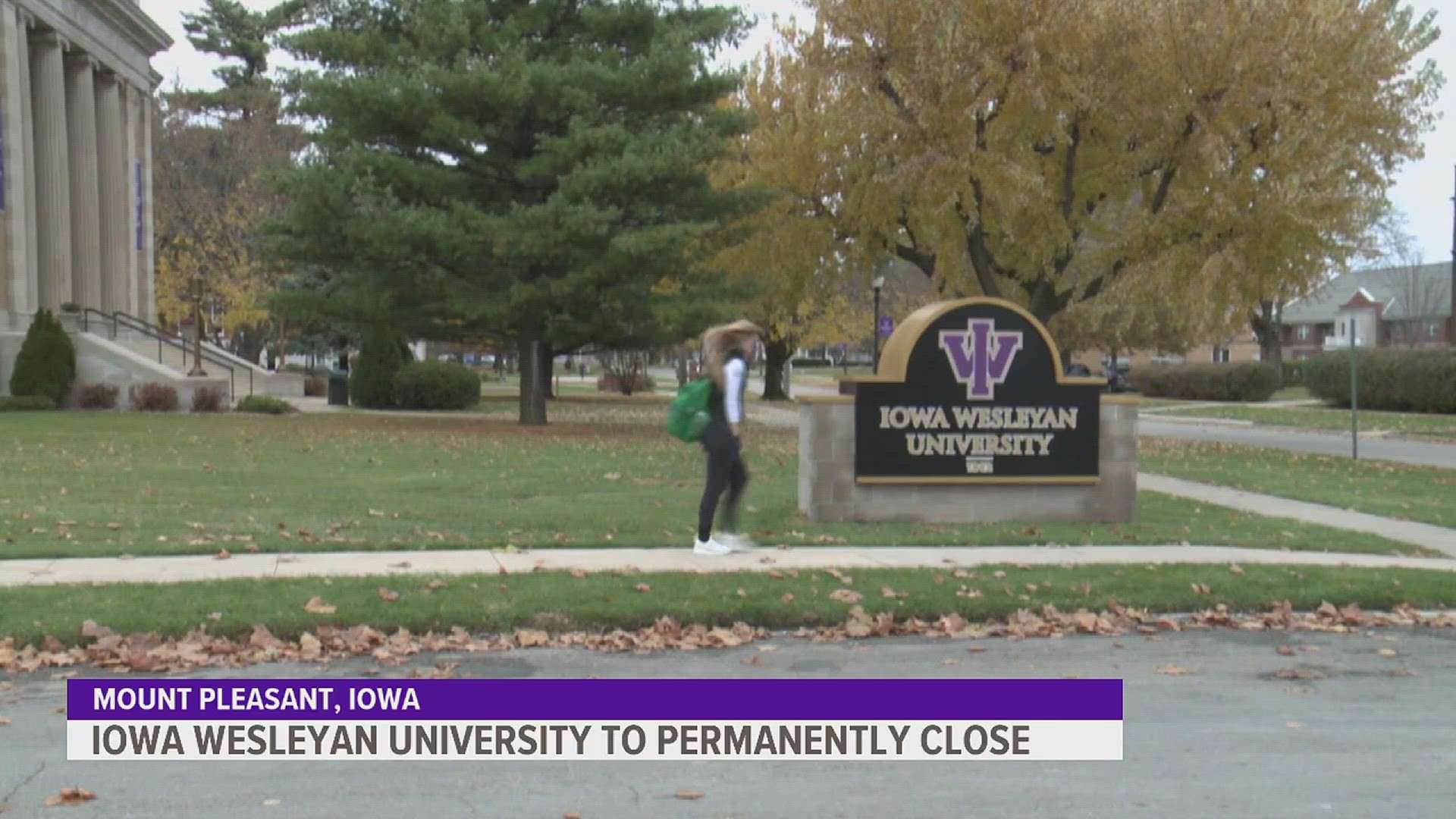MOUNT PLEASANT, Iowa — After 181 years of educating students, Iowa Wesleyan University will be shutting down for good at the end of the academic year.
The Mount Pleasant university said the decision follows "an intensive analysis" of its financial operations and "considerable exploration of all feasible strategic alternatives."
Overall, Iowa Wesleyan said the decision is based on increased operating costs due to inflation, changing enrollment trends, a "significant drop" in philanthropic giving and the "rejection of a proposal for federal Covid funding by Governor Reynolds."
However, the university said it has been experiencing "unprecedented enrollment growth," improvements in student retention and success with efforts to address economic and workforce development challenges in southeast Iowa.
While those are positive notes for the university, they say it isn't enough to keep it running.
“It is with deep sadness that we announce the Board of Trustees has made the heartbreaking decision to close our beloved Iowa Wesleyan after 181 years as an educational pillar in this community,” said Christine Plunkett, president of Iowa Wesleyan University. “Our focus is now on assuring our over 850 students have a smooth transition to another educational opportunity.”
The university's total enrollment is 878 students:
- Traditional, undergraduate full-time students: 701
- Online, undergraduate and graduate students: 133
- Part-time, non-degree-seeking students: 44
- Students living on campus: 493
There are four teach-out agreements with William Penn, Upper Iowa, University of Dubuque and Culver-Stockton College for students to complete their degrees. More agreements may be added.
“We know our action will be felt deeply by all Iowa Wesleyan University faculty, staff, students, families, alumni, donors, Mount Pleasant, and the entire region of southeast Iowa,” said Robert Miller, chairman of the Board of Trustees. “Like many colleges and universities nationally that have recently announced closure, IW has been confronted with many headwinds including increasing operating costs, declining numbers of high school graduates nationally and insurmountable inflationary pressures. We have worked tirelessly to find solutions at all levels but to no avail.”
The university had submitted a proposal for $12 million from the federal American Rescue Plan Act funds that were given to the state. However, it was denied.
“As a higher education institution that serves rural Iowa, we are disappointed in the lack of state support for this effort. All our indicators have been trending in a positive direction, but we needed funding to buy some additional time,” said Miller. “We are just heartbroken.”
Iowa Gov. Kim Reynolds responded to the closure in a statement issued shortly after the university.
“Today, my thoughts are with the students, faculty, and staff who are stunned by this announcement, and the people of Mount Pleasant who have long revered the university as a pillar of their community. The state is committed to supporting them during this time of transition. I have directed the Iowa Economic Development Authority and Iowa Workforce Development to reach out to community and business leaders, and work together to keep the local economy strong.
“It wasn’t until February 3, 2023, that my office received a request from the university for $12 million for ongoing operating costs. As I’ve said many times, we endeavor not to spend one-time federal dollars on ongoing expenses. To better understand their request and the financial health of the university, my office engaged an independent, third-party accounting firm to conduct due diligence. The firm reported that Iowa Wesleyan had a $26.1 million loan from the USDA, using their campus as collateral, that could be recalled in full as early as November 2023. Additionally, Iowa Wesleyan’s auditor cited ongoing concerns about the university’s fiscal health, stating “significant operating losses and reduced liquidity raise substantial doubt about its ability to continue as a going concern.” The firm also highlighted that that while enrollment at Iowa Wesleyan has grown over the past three years, their financial health has continued to deteriorate over the same period.
“Based on this and other factors, the independent accounting firm determined that providing one-time, federal funds would not solve the systemic financial issues plaguing the university. If the state would have provided the federal funding as requested and it was used to finance debt or other impermissible uses according to US Treasury guidelines, the state and taxpayers could have been liable for potential repayment to the federal government. Moreover, the state has separately received $122 million in requests from other universities and community colleges across the state.
“With this information, I made the difficult decision to not pursue the university’s funding request.”
Once the school closes on May 31, the buildings of the campus will become the responsibility of the United States Department of Agriculture.

